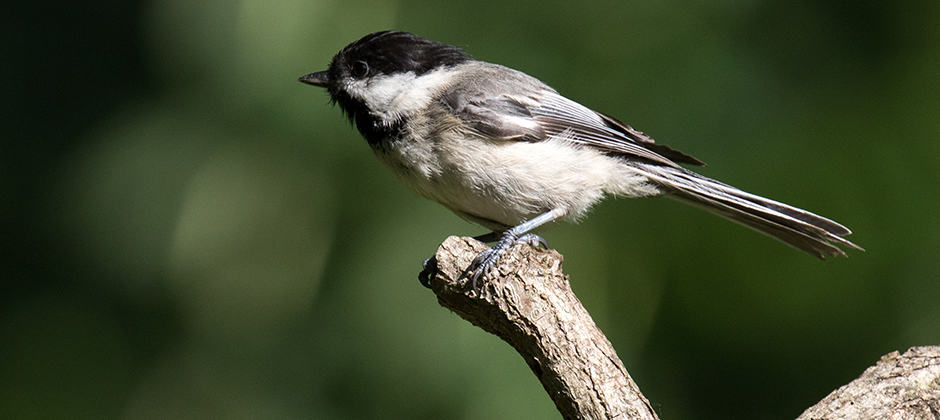Share this article
Chickadees remember their fear of predators
Black-capped chickadees remember their fear of predators from just one interaction with them, which has enduring effects on their behavior.
“In ecology, we’ve known for a long time from short-term behavioral studies that when you present birds at a feeder or a mouse in the field with a predator or a sign of a predator, that they very smartly stop what they’re doing and tend to the predator, which means giving up a meal or fleeing,” said Liana Zanette, a biology professor at Western University. “Whether or not fear of predators could lead to more chronic and more long lasting effects was really in question.”
Zanette led a study published in Scientific Reports looking at how black-capped chickadees (Poecile atricapillus) respond to predators over time.
She and her team caught wild chickadees around campus and brought them back into the lab. Then, they presented some birds with predator sounds and others with non-predator sounds for a couple of days, keeping them in chambers where they couldn’t hear other chickadees. After a couple days, the team housed all of the birds together outside in flocks. “They could just hang around with their buddies, getting the normal daylight and normal temperatures,” Zanette said. “If a predator did wander by, they would experience that.”
After a week — when they expected the birds could have an enduring effect from the predators — they brought them back into the lab and presented all of the birds, those that heard predators and those that heard non-predators seven days previously, with an alarm call that chickadees use to tell others that something dangerous is present.
“If they heard predator sounds one week previously, they did exactly what they should do. They became immobile, stopped moving around and spent all their time flicking their heads around to look for predators,” Zanette said. They did this much more than birds that hadn’t heard the predator sounds a week prior. “This shows they’re sensitive not just to the individual predator, but to any sign of danger.”
Then, the team looked at the enduring effects of fear in the chickadees’ brains, particularly in the amygdala, which deals with fear, and the hippocampus, where memories are stored. Again, they found a longer lasting effect in the birds that heard the predator calls a week prior.
In previous research, Zanette and colleagues experimentally demonstrated that when birds were exposed to predators, the number of offspring was affected. Frightened parents produced 40% fewer offspring over the breeding season because they were too busy looking for predators and spent less time foraging.
But Zanette said this isn’t necessarily a bad thing. “It makes sense for an animal to retain a long-term memory of fear because this is the thing that is going to keep them alive for another day,” she said. “You have to form these memories if you don’t want to die. They’re skimping on their quality of life to some extent but can survive to live and breed another day.”
This research can help researchers studying post-traumatic stress disorder learn more about the evolutionary benefits of maintaining a memory of fear, Zanette said. It can also help biologists understand more about the effects of introducing predators into an ecosystem. Will some species have to relearn fear and develop that fear memory?
Zanette said a next step is looking at which animals develop that fear, under what circumstances and why.
Many predators aren’t actually that great at what they do, Zanette said. About 70% to 80% of predator attacks are actually unsuccessful. Giraffes carry the scars of lions claws. Manta rays sport shark bites. Butterflies are nipped by birds.
“Many, many individuals have actually escaped from the jaws of a predator,” Zanette said.
“It only makes sense that they carry the memory.”
Watch this video to learn more about how fear affects wild birds.
Header Image: Black-capped chickadees retained a memory of their fear of predators. ©ksblack99








